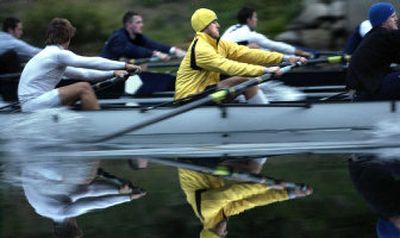Rowers pull for the team, tradition

Before the roosters crow, before night’s black curtain begins to fray, Dan Gahn’s charges march to the river’s edge with The Bear held overhead.
On command, they lower the load to their waists, then with a quiet groan slide it into the Spokane River’s still water where they board The Bear, a 58-foot rowing shell. They begin to row.
It is 5:30 a.m., and the Gonzaga University varsity men’s crew team is making its Tuesday trip from Upriver Dam to Spokane Valley.
“That’s too soft, Leanne,” coach Gahn barks. “No one’s pulling on it.”
Two teams of eight rowers and two coxswains respond with a collective pop of their oarlocks. Whump.
The cigar-shaped vessels, The Bear and a boat yet to receive a name, cut through the water like letter openers, pulling at two wet seams but leaving the surface otherwise undisturbed. Tiny amber lights on the bow and stern of each craft are all that can be seen.
Few people realize the boats pass through here. They travel upstream from Upriver Dam almost to Plantes Ferry Park before most houses along the river show any signs of life.
“There’s just some kind of attraction to the river,” said Dave Hinshaw, the team’s co-captain. “It’s very calm, very placid. We get up past the Argonne Bridge and it’s hard to breathe for a minute, then you get into the calm water and the changing leaves.”
Rowers take in the scenery in reverse and at the risk of getting out of synch. The coxswain at the back of the boat faces forward, steers and barks out commands. The Bear’s coxswain is female. Crews generally want their coxswain to weigh 125 pounds or less, Gahn said. It’s easier to find a woman who meets that requirement.
Other than the coxswain’s commands, Hinshaw tries to think of nothing but his stroke and working in unison with the men around him. There is one spot on a concrete wall on the north bank just upstream from the Argonne Bridge. There he spies a capital “G” for Gonzaga that has had the horizontal bar across its midsection turned into an oar. Moss partly covers the fading logo, which gives rowers a sense of reverence for the crews that raced before them.
An opportunity like this isn’t presented to just anybody; it’s presented to everybody. Rowing coaches stand in front of Crosby Hall during freshman orientation with a 58-foot boat and 12-foot oars. They put the shine on their myriad rowing trophies and dangle them like spinners, hoping to get a nibble from young men with a free safety’s physique and a marathoner’s endurance.
“Crosby – everyone who is a freshman has to go there. We’re kind of like birds of prey,” Hinshaw said. “We rush in on them and ask if they’ve ever considered rowing.”
What they don’t ask the strapping frosh is whether they’ve considered losing their shirts.
It’s a long-standing crew tradition that in dual races, a sort of drag race between two boats, the loser strips to the waist and surrenders his tank top, still hot and wet with sweat from competition.
Bystanders in the know recognize that a group of young men shirtless on the riverbank have been measured and come up short.
This ritual has become a sticking point with the National Collegiate Athletic Association, the governing body of nearly all collegiate scholarship sports. The NCAA considers the relinquishing of shirts a wager and against its gambling policy. The much older and independent Intercollegiate Rowing Association, which governs men’s rowing, considers losing one’s shirt as sacrosanct as tinsel on a tree.
But The Bear often crosses the finish line first without collecting its opponent’s tanks. The oldest American college sport is also one of the nation’s most poorly funded. And no one wants to add to the lactic acid burn of losing a race by taking a man’s only shirt.